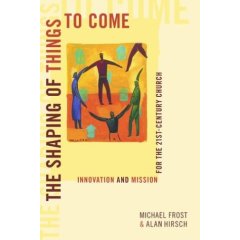Some people ask the same question of the church. Maybe people who are disenfranchised with traditional models of church will get together with a Christian friend over a coffee and say "we're the church!!" But is this the church??
This raises questions about the essential nature of the church. I've been tossing this question around for about 10 years (since I started pastoring) and it has been the topic of discussion at Mimos as well as we've tried to identify the essential characteristics of the church and remove those things that are purely cultural or hangovers from a previous era.
In preparing to teach Planting and Growing Healthy Churches at Kingsley this Semester I have re-read The Shaping of Things to Come by Mike Frost and Alan Hirsch.
 They identify these three core aspects of the church
They identify these three core aspects of the church1. Communion (In Relationship with Christ)
Worship
Learning
Fellowship
Serving/Giving
Gospel telling/Sharing
They comment that, “many people accept church as it currently happens because they assume their local church service is somewhere prescribed in the pages of Holy Writ. As long as these three Cs are present and being maintained, any group of Christians can legitimately be considered a church in any place.”
The following questions are given to clarify their point:
- Do you need to meet in a church building? Not necessarily.
- Do you need to meet weekly? Not necessarily. The first Christians met every day. A church can meet as often as it needs to fulfil the above commitments.
- Do you need a minister? No necessarily. The New Testament is clear on the need for accountability, admonishment, and learning. It does speak about leaders (elders) exercising humble and loving care for a community. But you don’t need an ordained minister for that.
- Do you need to sing hymns? Not necessarily. There is mention in the New Testament of the value of singing spiritual songs. But if the goal is that worship and learning occur when you meet, you can use as few (none?) or as many songs as you need.
- Does someone have to bring a sermon? Not necessarily. As long as people have an opportunity to hear from God through his Word and other means, it doesn’t matter if one person speaks for thirty minutes or thirty people speak for one minute each. Learning, worship, and the opportunity for God’s Word are essential. How they play out is entirely open to experimentation.

5 comments:
A couple of Scriptures came to mind as I read your blog.
Acts 2.42 - breaking bread / apostles doctrine / fellowship / prayer
Eph 5.19 speaking to yourselves in psalms, hymns and spiritual songs,singing and making melody in your hearts to the Lord.
Encouraging to see the free biblical thinking
Stuart
Was that a misprint? "There is no mention in the New Testament of the value of singing spiritual songs." Surely that "no" wasn't mean to be there.
I'm not sure the illustration you began with sends the right message. The young man's desire to know "the minumum" required for his vows is hardly a commendable approach to marriage. Is "what is the minimum required for church" really where we want to be? I know that's not what you're trying to say which is why the illustration may not open up the subject in quite the right way.
On getting rid of the "merely cultural." Certainly there is cultural baggage than can get in the way of the Gospel, and we would want to be rid of that sort of thing. But might there also be value in aspects of the church's culture (for example her music tradition)that embody the Gospel in an effective way and are worth preserving (even if not trendy). Is stripping back to "just the basics" really the ideal?
Sorry about the typo - It now reads "There is mention in the New Testament..."
I take your pointon the illustration Glen. The minimum is not the right question to ask but it is helpful to consider what is essential.
There are people who think that any gathering of Christians is the church but this is not true. There are some essential elements of the church. The other extreme is true as well - which I have highlighted - that some people count much more as essentail to the church than the Bible actually prescribes.
Thanks for the comments on my ramblings.
Hi Peter,
I'm Ross' wife and after your email I thought I would pay you a visit.
Seems to me in the discussions I've had about church models, that the model in Acts 6:2 has been largely overlooked. The disciples were relieved of administrative duties so they could concentrate on the ministry of the word of God. I was fortunate to grow up spiritually in a church where the pastor didn't neglect the ministry of the word. (He also taught us to get beyond just singing songs and actually connect to God through worshipful songs.) The results were the same as in Acts 6:7 the number of disciples grew. These days some many pastors are either weighed down with administrative duties or expected to be "tentmakers". Consequently the ministry of the word is neglected, we don't get powerful sermons and our churches don't grow. I'm not saying this is always the church's fault, sometimes the pastors choose to get side tracked. Having experienced a church model that worked I personally find it difficult to consider other models but I can understand why people do.
Thanks for the comment Susan. I agree that the focus is mostly on Acts 2 in terms of understanding the emerging New Testament church. The reminder of Acts 6 - the word of God and prayer - is particularly important for Christian leaders and pastors - this is their primary responsibility.
Post a Comment